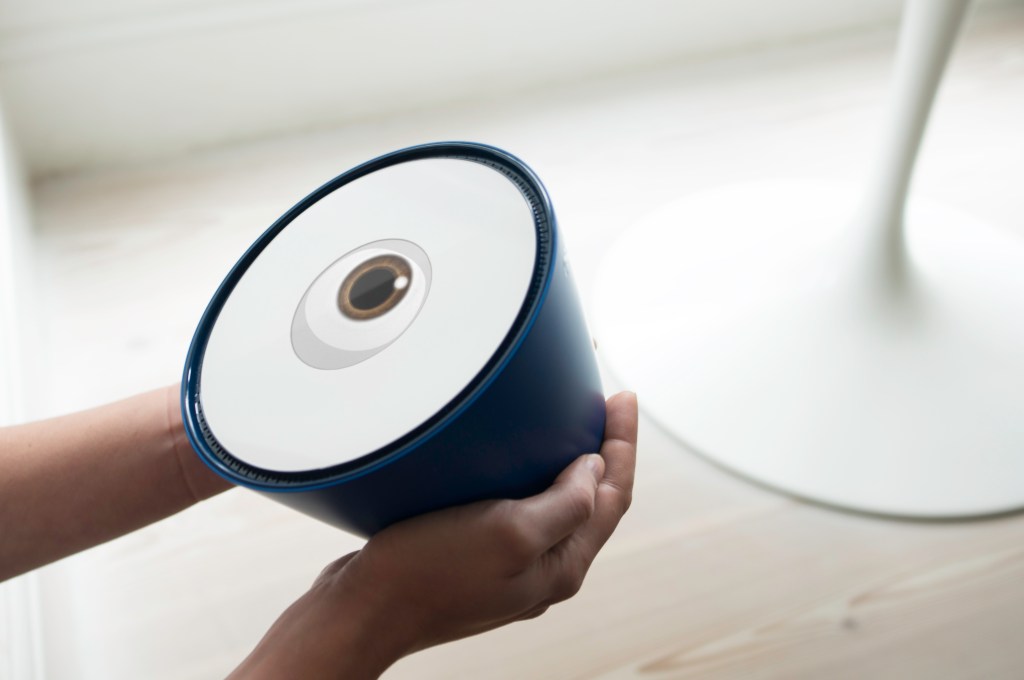A robot with a unique personality might sound like an oxymoron. Or science fiction. But that’s the goal of London-based startup Emotech, launching on stage at TechCrunch Disrupt London 2015 today, with a plan to crowdfund its first product, a voice-controlled robot assistant called Olly, early next year.
The bot takes the form of an animated eyeball that is housed in a lamp-shaped cup designed to roll around on your tabletop. So if the thought of a large blinking eyeball that swivels around to look at you when you speak — and talks back — makes you feel at all uneasy, well, this may not be the bot for you.
Emotech insists the look they’re going for is cute, not creepy. The team includes an ex-Dreamworks animator who has worked on movies including Rise of The Guardians and The Croods.
Right now Olly is just a prototype, and the team had some demo troubles with their prototype on stage. But the vision is a “smart lifestyle assistant,” says co-founder Chelsea Chen — one that will have a unique personality, based on the personality of its particular owner. How you interact with Olly, and what your personal interests are, will be used to determine the “tonality” of your bot, she says.
“Based on the AI and the machine learning, we create a special persuading system which [along with the owner] will give Olly special personality,” says Chen. “Your Olly will be different to my Olly. Because your personality is different to mine, and your lifestyle is different.
“For example… I’m quite curious about everything, so my Olly is more pro-active, talks fast and any time when I try to communicate with Olly, Olly always try to give me more information, more options to suggest. But if the person who is more serious, is more logical, all the information Olly will give is not like my very emotional [Olly] but that one will be very data driven.
“Four of us [at Emotech] are super fans of science-fiction movies so in our mind building a robot is the dream — it’s the thing we really want to do,” she adds.
But what exactly will Olly do? As with other voice-commanded, in-home connected devices — or indeed app-based voice assistants like Apple’s Siri — Olly will be able to perform info look-ups such as telling you what the weather is going to be like or providing your wake-up call in the morning.
It will also be able to be used as a hub for controlling multiple smart home devices, so you could ask it to dim your smart lights, say, and put some music on your wireless speakers (or on its own speakers). When it launches, the devices and services it will be able to hook into include Nest, Philips Hue, Fitbit, Pebble, IFTTT, Spotify and various social media services, according to the team.
Beyond the basic connected voice-command stuff — which you can of course already do with a device like the Amazon Echo, for example — the idea is that Olly will also be doing some autopiloting of your domestic lifestyle needs, as it gets to know you better and learns your habits.
For example, perhaps you always like to listen to a particular type of music when you get home from work. Olly could figure this out and fire up the relevant tunes — before you’ve had time to say: ‘Hey Olly, play me some smooth jazz’.
How long it will take the bot to adapt to your routines will depend on what you like to do and how often, says co-founder Hongbin Zhuang. If it’s a weekly activity, like reading, it might take several weeks to learn your preferences. “But for example let’s say wake up in the morning or daily workout it can get the data more frequently which means it does not need a lot of time to learn the curve,” he adds.
The bot’s flagship functionality is focused on smarter scheduling, so it’s being designed to help “time-poor professionals” who might need a little help optimizing their routines. So you could, for example, tell it a general goal of helping you read more books in the month — and then it will set about prompting you at (hopefully) opportune moments when it thinks you might have a window in your busy schedule to sit down and read.
“The basic concept is a little bit like Nest,” adds Zhuang. “Olly can… evolve its personality based on its users’ preferences and patterns.
“Initially the user will let Olly know what they want to achieve — what kind of lifestyle they want to have. And then based on this, Olly is going to be able to help the user to organize their schedule and also make some proposals — for example what is a better time for reading, or what’s a better time for jogging.”
The underlying OS for Olly is based on Android. The team intends to release an SDK to expand the functions their device will be able to offer — so they’re envisaging an app store model helping to grow Olly’s utility with the help of outside developers.
In terms of how the device works, it will listen continually for a voice trigger command before sending any voice data to its cloud platform for processing. So the co-founders claim it won’t be harvesting and data-mining your private conversations — only recording the stuff you’re directing at it. (They also say the user will be able to delete any of the data sent by Olly to the cloud via the companion app.)
As well as being equipped with sensitive microphones designed to pick out voice commands from the general domestic chaos, Olly also has a camera for facial recognition and computer-vision-powered image processing so the bot can figure out who it’s looking at and respond accordingly.
Facial detection is done locally on the device, but again, facial recognition requires cloud processing. So when Olly detects a face in its vicinity, it takes a photo and uploads that to the cloud to try to figure out who it’s looking at. (It is also designed to physically turn to face the person speaking to it, much like another social robot in-the-making, Jibo.)
“Through face and voice recognition, Olly knows who is the direct owner, but Olly cannot tell who is the guest,” adds Chen, explaining what will happen when the robot encounters a person it doesn’t yet know.
She says the process of introducing new people to Olly “can be controlled by the direct owner” and will be “like a real friends introduction” — so the owner can presumably say, ‘Olly this is my friend Gemma’ and the bot will record the name and a photo of the person’s face for future reference.
[tc_aol_on code=”519311089″]
Eyeing up the market
Olly is still about a year-and-a-half away from arriving on the market and does not have a first-mover advantage in this space. There are already several ‘social robots’ at a more advanced stage of development, such as the aforementioned Jibo. Or Softbank’s Pepper. Not to mention the various other voice assistants — whether they’re in app form, like Siri, or also a connected device, like Amazon Echo. So there’s plenty of competition lining up to sell the concept of AI-powered convenience to consumers.
It’s also questionable how much consumer desire there is for this sort of tech — especially as it’s really only as useful as it is capable. And, at this nascent stage, its capabilities aren’t always that useful. So it’s a bit of a Catch 22 situation. Even Apple’s Siri, as it is now, remains an iOS feature, rather than a killer app.
Despite all these challenges the Emotech team is upbeat about its mission and about mainstream adoption of robot assistants — as well they must be to be spending so much time and effort building Olly. The team expects a timeframe of three to five years before social robots start gaining traction with the mainstream, pointing to smart home devices as the tipping point to get consumers feeling hassled enough to want a robot minion to do some of their domestic lifting.
Emotech has raised £500,000 in angel funding so far from an undisclosed Chinese investor, and will be setting an initial target of $100,000 to raise from their crowdfunding campaign next February, although they’re hoping to pull in closer to $500,000.
“We see huge potential in the smart home market. There are going to be 25 billion devices connected to the Internet and most of them are home devices,” says Zhuang. “So we need this kind of smart hub to help people interact with all these kind of devices.”
In terms of how Olly compares with the most similar rival device at this stage (Jibo), they stress the market positioning is different — with the latter being pitched as a device for the whole family, whereas Olly is intended to be personal; a robot assistant for an individual. While other members of your household will be able to interact with your robot, they’ll only get general responses — not the tailored-to-you tonality the true owner will hear.
Olly is also being designed to be more portable than rival devices. They envisage people carrying it around the house as they move from room to room and into different parts of their domestic routine. So it will have a built-in battery which they say will be good for some eight hours of operational time (although between three to four hours of active use per charge).
Whether people will really want to scoop up and carry a digital eyeball around the house with them, especially given they probably already have their smartphone with them — and perhaps several wearable devices too — remains to be seen. Cost wise, they’re not fixed on a retail price point yet but Chen suggests Olly will be in the region of £200 to £300.
The original idea for making a personalized robot assistant came to Zhuang when he was completing his human computer interaction course at University College London. Why make a hardware device at all and not just an app? “It’s about embodiment,” he says. “The product, let’s say a smartphone, is a device. And you wouldn’t treat it like a creature, or kind of emotional system.”
Whether consumers will warm to an adaptable device like Olly as if it were a human, or view it as just another gadget filled with algorithms, is an open-ended question right now — one which depends on whether AI can live up to those sci-fi dreams.
Judges Q&A
Q: Question about the future of the company – is your ambition to move away from hardware and then license the AI out?
A: Now we’re building the hardware we believe the interaction between people and tech when you have your own hardware the voice detection is going to be much more accurate than for example smartphone.
This is our first product. We’re going to open our platform. And integrate and provide our AI system to other companies.
Q: Do you carry Olly around? How do you interact with it?
A: The final one will be smaller and lighter. In general Olly going to live in the main places you’re going to interact with it. For example in the living room. In the morning it can wake you up. We’re going to build our own voice detection system so the microphone can detect you across the room.
When you cooking, you put Olly in the kitchen. When you sleep you put it beside you.
Q: How does it differ from Amazon Echo?
A: In terms of Echo a lot of similar devices on the market. We are trying to make the interaction between the robot and the user more human like. As you can see it can have different emotions. It has personality based on your personality.







































Comment